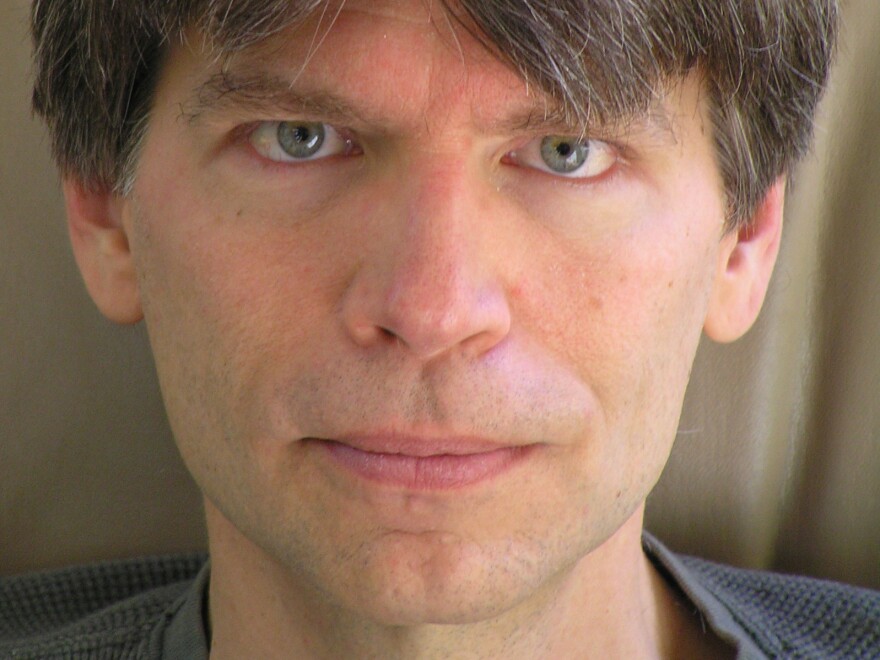Richard Powers' new novel, Orfeo, tells the story of an avant-garde classical music composer who finds himself dabbling in DNA. Like the Orpheus myth that inspired the book's name, this story takes its hero, Peter Els, on a journey. He becomes a fugitive accused of bioterror, but what follows is also a walk back into the recesses of his own memory told through the music and people he's loved and lost.
Powers says he identifies with composers who are struggling to make complex, compelling works. "This balancing act between wanting to make it new and wanting to make it loved and beautiful is familiar to me," he tells NPR's Audie Cornish. "It's something that I've been wrestling with over the course of 11 novels and close to 30 years now. You write the kind of book that you wish you could find on the shelf somewhere, and you wait for someone who has the time and the focus and the desire to go deeper and to read a new story."
Interview Highlights
On his protagonist, Peter Els
Els starts college as a young man studying chemistry and he's very gifted as a scientist and he's fascinated with this search for the patterns of the biological world. And he moves from this pursuit quite easily into musical composition and that same desire to find ordered and meaningful patterns. At the end of his life, Els finds himself drifting back to this road not taken and gets obsessed with finding music inside of living things. And his last transgressive artistic gesture is to try and encode a musical strain and insert it directly into a living organism.
On the book as "a meditation on the security state"
His house is raided and he does go on the run but he has enough of a jump that he isn't immediately under threat of being apprehended. But he becomes instantly aware of how his every move is leaving a data trail behind. He can't run his credit card through a gas pump, he can't make a phone call or check out a library book.
While I was working on the book, I was a little bit afraid that I might have been overstating this kind of paranoia ... when the book went into final production and I was proofing galleys, the Snowden disclosures about NSA and PRISM [NSA's surveillance program] broke and suddenly I thought, I wouldn't mind going back into the story and juking up that part of the novel a little bit. ... Everything that I described now seemed like understatement. This notion that ordinary citizens are subject to widespread surveillance is now something that we're learning all about, every day.

On describing pieces of music that don't actually exist
My challenge as a writer was how to create descriptions not just of canonical 20th century pieces, but to create vivid descriptions of fictional pieces. Works for small ensemble, for voice, symphonic orchestra, operatic works that did not exist and yet describe them in a way that was vivid and compelling and re-created the internal drama of the composer as he was at work on them. So it was almost as if I had in my own head to write the music first and then produce a kind of prose that recaptured the music and the rhythm and the challenge and the transgression of these pieces.
On living vicariously through his characters
The great beauty of being a novelist is that you can spend three or four or five years vicariously pursuing those imaginary Walter Mitty-like lives that you never got to pursue in the real world. I do have a stack of youthful compositions sitting on the bottom of my closet, so it was a great pleasure to spend these years working on this book — not just rediscovering the 20th century and this avant-garde tradition, but also to imagine myself into the life of somebody who sees and hears and feels the world through sound.
On our modern approach to music
It's a great challenge to the maker of music that requires a kind of concentrated and repeated listening to realize that we're living in an age where all music is available potentially all the time to everyone from everywhere and the ability of any one piece to make claims on the attention is almost overwhelmed by this flood of superabundance. He is working out of this tradition — composers like Shostakovich, for whom music was a matter of life and death, or [Olivier] Messiaen, for whom music was a way of surviving a concentration camp in the middle of winter — and is now presented with a world where a lot of music is used primarily to fill the silence while driving or jogging. And that, too, is music, but his personal crisis is what to do with this desire to create a complex music in a world that's become overfilled with instant, satisfying, entertaining, easy-to-access sound.
On composers and writers sharing a struggle
The struggle to find something that can expand or extend what we already know how to hear — and yet still be somehow seductive or familiar enough to be accessible — is also not only my struggle but anyone who is interested in creating literary fiction. But we have it pretty good compared to composers. The person who has committed to written out music has watched an art over 100 years go from being extremely provocative and dangerous and threatening to the status quo to ... troubling almost no one.
Copyright 2023 NPR. To see more, visit https://www.npr.org.

